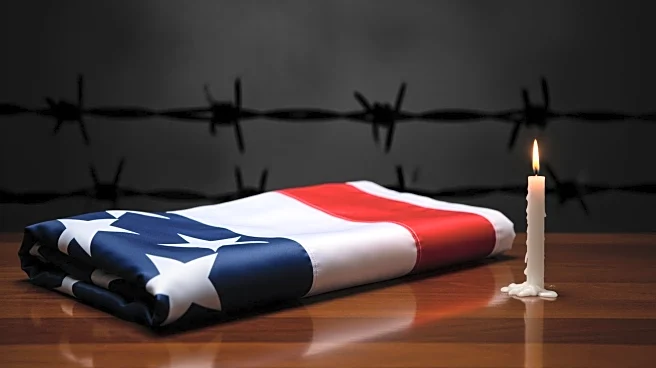What's Happening?
Israel is working to identify the body of Staff Sgt. Itay Chen, a deceased hostage returned from Gaza. Chen, who held German and U.S. citizenship, was killed on October 7. His family has called for a state
commission of inquiry into the circumstances surrounding his death. The Red Cross is involved in the process of receiving the body, which was found in Gaza's Shujaiyeh by Hamas. This development is part of a broader context of ongoing violence, with the IDF reporting the killing of two Palestinians in central Gaza, classified as terrorists, and a Hezbollah member in southern Lebanon. Additionally, Hamas has received the bodies of 15 Palestinians from Israel, bringing the total number of bodies received to 285.
Why It's Important?
The identification and return of Staff Sgt. Itay Chen's body highlight the complex and ongoing conflict between Israel and Gaza. This situation underscores the humanitarian challenges and the need for diplomatic efforts to address hostilities. The involvement of international organizations like the Red Cross signifies the global attention and concern over the conflict's impact on civilians and military personnel. The call for a state commission of inquiry by Chen's family may lead to increased scrutiny of military operations and hostage situations, potentially influencing public opinion and policy decisions in Israel and abroad.
What's Next?
The ongoing violence and exchange of bodies between Israel and Hamas suggest that tensions remain high, with potential for further military engagements. The call for a state commission of inquiry into Chen's death may lead to investigations that could impact Israeli military policies and international relations. Additionally, diplomatic efforts, such as Turkey's discussions with Hamas on the Gaza cease-fire plan, may play a role in shaping future negotiations and peace efforts. The situation remains fluid, with potential implications for regional stability and international diplomatic relations.
Beyond the Headlines
The broader implications of this development include ethical considerations regarding the treatment of hostages and the conduct of military operations. The involvement of international bodies like the Red Cross highlights the importance of humanitarian law and the protection of human rights in conflict zones. The ongoing exchange of bodies and the call for inquiries may lead to increased advocacy for transparency and accountability in military actions, influencing both domestic and international policy frameworks.









